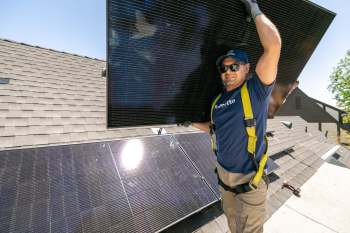The U.S. Department of Energy is canceling $3.7 billion in clean energy funding, Bloomberg reported — a move that risks stalling energy innovation, cutting jobs, and delaying access to affordable energy nationwide.
What's happening?
On May 30, U.S. Secretary of Energy Chris Wright announced the termination of 24 projects awarded by the Office of Clean Energy Demonstrations, cutting over $3.7 billion in funding for programs aimed at developing healthier, less expensive power.
Most of the affected undertakings focused on capturing pollution and other efforts to reduce harmful pollution from energy systems.
The DOE said in a press release that the projects failed to serve the country's energy needs and wouldn't ensure a positive return on investment of taxpayer money.
Canceled awards include $331 million to Exxon Mobil Corp. for a hydrogen development in Texas and $170 million to Kraft Heinz Co. for various clean energy projects, per the Bloomberg report.
Why is the funding cancellation concerning?
Canceling these endeavors leads to the loss of thousands of potential jobs. Princeton University researchers previously projected that the sector could create 5 million new jobs between 2019 and 2050, especially as demand for more affordable energy sources continues to grow.
While the cancellations may save billions in taxpayer money in the short term, they risk delaying access to affordable, reliable less-polluting energy, even as more communities and industries seek cleaner power solutions.
That step back could actually cost taxpayers more in the long run, as the forms of energy that will have to pick up the slack — like oil and methane gas — have risks of spills, explosions, and fires, in addition to their byproducts contributing to increasing global temperatures. Higher temperatures lead to worsened weather, such as heat waves, drought, and hurricanes, which can all be costly in their own ways.
What's being done about the canceled funding?
The federal government has not announced any alternatives yet, but other federal and state programs continue to invest in sustainable energy sources. The Inflation Reduction Act still offers financial support with tax credits and rebates for transitioning to clean energy solutions.
However, these incentives may also be at risk. President Donald Trump has mentioned intentions to unravel energy-efficiency policies, so it's better to take advantage of these incentives sooner rather than later. EnergySage is a great place to start, as it's like an Expedia for solar panels and heat pumps and can help to navigate government tax credits worth thousands of dollars.
Individuals can also do their part by supporting less polluting initiatives, like upgrading to a cleaner bank that supports green power projects or rewards sustainable purchases with cashback. Voting for pro-climate candidates, regardless of their side of the political aisle, can help advance laws and policies that can benefit both public health and the environment.
|
Would you support a tax increase to pay for high-speed rail in your state? Click your choice to see results and speak your mind. |
Join our free newsletter for good news and useful tips, and don't miss this cool list of easy ways to help yourself while helping the planet.













